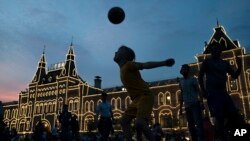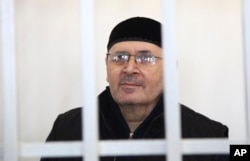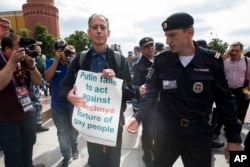Human rights campaigners say Russia is using the glitz of the World Cup to try to gloss over its deteriorating human rights record — and they want tournament organizer FIFA to use its leverage to force change.
The 12 Russian host cities have enjoyed a World Cup makeover, as Russia presents a friendly face and photogenic scenery to hundreds of thousands of visitors. Tanya Lokshina, Russia program director at Human Rights Watch, is urging visitors to dig a little deeper.
"Our message to the fans is: Take a little time and learn more about the human rights crisis in Russia today, about what is, in fact, happening under the tournament's glitter." She described the situation as the biggest crisis since the fall of the Soviet Union.
"Russian citizens are denied their rights to speak freely, to protest freely, and people actually go to jail for posting online things like 'Crimea is not Russia.'"
Among those locked up is Ukrainian filmmaker Oleg Sentsov, who criticized Russia's annexation of Crimea, and is serving a 20-year jail term on terrorism charges.
In the Russian republic of Chechnya, Oyub Titiev, director of the human rights group Memorial, has been detained on drug charges, which his supporters said are false and politically motivated.
Before the 2014 Sochi Winter Olympics, Russian President Vladimir Putin ordered the release of several political prisoners. Campaigners are hoping he may repeat the gesture.
"We got a confirmation from FIFA that the organization's leadership is engaging on the issue and hoping for a positive resolution," Lokshina said.
FIFA President Gianni Infantino insists world football's governing body is engaging Russia on the issue.
"Concrete progress has been made in terms of human rights and the way we are dealing with human rights questions. Also through football and through an event like the World Cup," he said in a recent interview.
On the opening day of the World Cup, gay rights campaigner Peter Tatchell was arrested after staging a protest outside the Kremlin, calling for an investigation into the torture and disappearance of several gay men in Chechnya. In 2007, Tatchell was attacked in Moscow by neo-Nazis and suffered partial brain damage.
A short walk from the Kremlin lies Diversity House, set up to provide a safe space for LGBTQ and other minorities to watch the games. Pavel Klymenko, of the equality campaign group FARE Network that organized the facility, said it is intended to make a political point.
"This house is a way of saying to everyone — to the footballing world, to the Russian society — that minorities are part of the game, part of society."
The fear is that once the fans and footballers return home, Russia's human rights crackdown may intensify.







